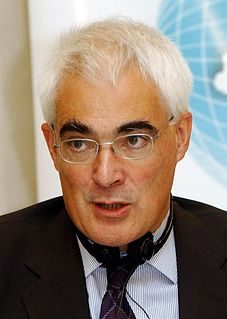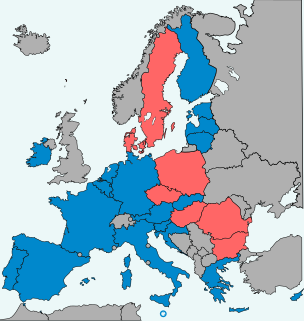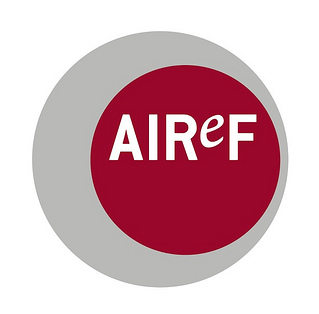 W
WThe Eurozone crisis is an ongoing financial crisis that has made it difficult or impossible for some countries in the euro area to repay or re-finance their government debt without the assistance of third parties.
 W
WA bank rescue package totalling some £500 billion was announced by the British government on 8 October 2008, as a response to the global financial crisis. After two unsteady weeks at the end of September, the first week of October had seen major falls in the stock market and severe worries about the stability of British banks. The plan aimed to restore market confidence and help stabilise the British banking system, and provided for a range of what was claimed to be short-term "loans" from the taxpayer and guarantees of interbank lending, including up to £50 billion of taxpayer investment in the banks themselves. The government also bought shares in some banks, which have since been sold back to the market at an overall profit to the taxpayer.
 W
WThe Bureau for Economic Policy Analysis is a part of the Ministry of Economic Affairs and Climate Policy of the Netherlands. Its goal is to deliver economic analysis and forecasts. The CPB is an independent government agency founded at 15 September 1945 by Nobel laureate Jan Tinbergen. On 21 April 1947, it obtained its legal basis. It is located in The Hague, on Bezuidenhoutseweg.
 W
WThe Euro-Plus Pact was adopted in March 2011 under EU's Open Method of Coordination, as an intergovernmental agreement between all member states of the European Union, in which concrete commitments were made to be working continuously within a new commonly agreed political general framework for the implementation of structural reforms intended to improve competitiveness, employment, financial stability and the fiscal strength of each country. The plan was advocated by the French and German governments as one of many needed political responses to strengthen the EMU in areas which the European sovereign-debt crisis had revealed as being too poorly constructed.
 W
WThe European Financial Stabilisation Mechanism (EFSM) is an emergency funding programme reliant upon funds raised on the financial markets and guaranteed by the European Commission using the budget of the European Union as collateral. It runs under the supervision of the Commission and aims at preserving financial stability in Europe by providing financial assistance to member states of the European Union in economic difficulty.
 W
WThe European Financial Stability Facility (EFSF) is a special purpose vehicle financed by members of the eurozone to address the European sovereign-debt crisis. It was agreed by the Council of the European Union on 9 May 2010, with the objective of preserving financial stability in Europe by providing financial assistance to eurozone states in economic difficulty. The Facility's headquarters are in Luxembourg City, as are those of the European Stability Mechanism. Treasury management services and administrative support are provided to the Facility by the European Investment Bank through a service level contract. Since the establishment of the European Stability Mechanism, the activities of the EFSF are carried out by the ESM.
 W
WThe Treaty on Stability, Coordination and Governance in the Economic and Monetary Union; also referred to as TSCG, or more plainly the Fiscal Stability Treaty is an intergovernmental treaty introduced as a new stricter version of the Stability and Growth Pact, signed on 2 March 2012 by all member states of the European Union (EU), except the Czech Republic and the United Kingdom. The treaty entered into force on 1 January 2013 for the 16 states which completed ratification prior to this date. As of 3 April 2019, it had been ratified and entered into force for all 25 signatories plus Croatia, which acceded to the EU in July 2013, and the Czech Republic.
 W
WThe European Stability Mechanism (ESM) is an intergovernmental organization located in Luxembourg City, which operates under public international law for all eurozone Member States having ratified a special ESM intergovernmental treaty. It was established on 27 September 2012 as a permanent firewall for the eurozone, to safeguard and provide instant access to financial assistance programmes for member states of the eurozone in financial difficulty, with a maximum lending capacity of €500 billion.
 W
WThe Independent Authority for Spanish Fiscal Responsibility is an independent agency for fiscal control in Spain. It was created in 2013 by the Spanish Government, on the initiative of the European Union and to implement a constitutional mandate. Its aim is to guarantee the principle of budgetary stability, as well as the country's financial sustainability. Its office is in Madrid.
 W
WThe EU economic governance, Sixpack describes a set of European legislative measures to reform the Stability and Growth Pact and introduces greater macroeconomic surveillance, in response to the European debt crisis of 2009. These measures were bundled into a "six pack" of regulations, introduced in September 2010 in two versions respectively by the European Commission and a European Council task force. In March 2011, the ECOFIN council reached a preliminary agreement for the content of the Sixpack with the commission, and negotiations for endorsement by the European Parliament then started. Ultimately it entered into force 13 December 2011, after one year of preceding negotiations. The six regulations aim at strengthening the procedures to reduce public deficits and address macroeconomic imbalances.
 W
WThe Treaty Establishing the European Stability Mechanism was signed by the member states of the eurozone to found the European Stability Mechanism (ESM), an international organisation located in Luxembourg, to act as a permanent source of financial assistance for member states in financial difficulty, with a maximum lending capacity of €500 billion. It replaced two earlier temporary EU funding programmes: the European Financial Stability Facility (EFSF) and the European Financial Stabilisation Mechanism (EFSM). All new bailouts of eurozone member states will be covered by ESM, while the EFSF and EFSM will continue to handle money transfers and program monitoring for bailouts previously approved for Ireland, Portugal and Greece.